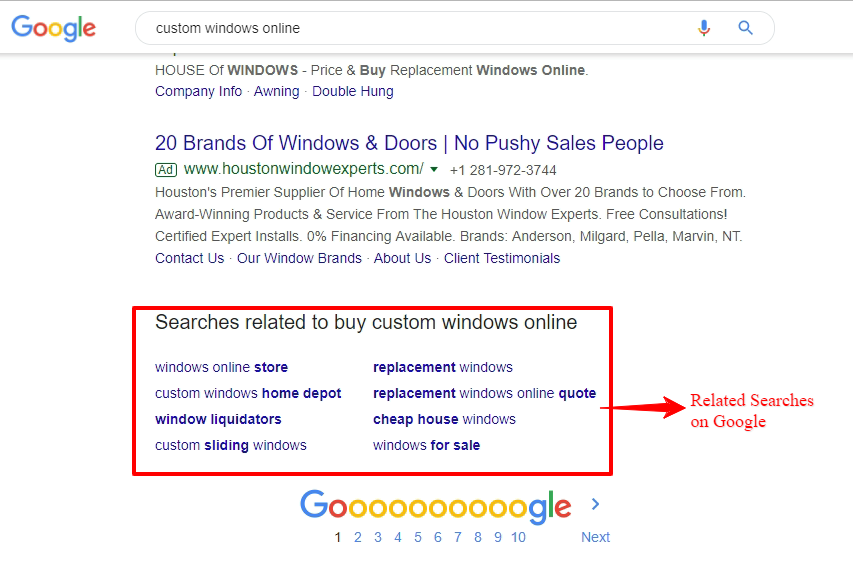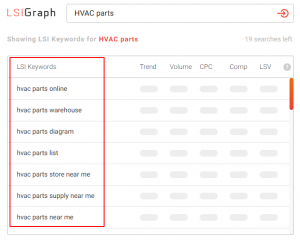Are you still living in the old SEO world where webpages are crammed with keywords? If yes, it’s time to snap out of it!
SEO is complicated but more so for ecommerce stores. You cannot just showcase keyword-rich content or titles and hope to rank high in the SERP. In fact, practices like stuffing unnatural keywords in your content and keyword cannibalization can ruin your SEO efforts.
Although keyword stuffing was a popular practice among marketers, Google and other search engines have since improved their algorithm, enabling them to locate keyword spamming. Therefore, ecommerce firms should invest their time and resources in creating a sound marketing strategy that offers them a leg up on their competition.
Google looks for purchase-intent keywords that contain modifiers like a call to action (purchase, order, or buy), price (inexpensive or low-cost), or location (near me or city). Thus, search engines can easily detect and penalize keywords-stuffed content that lacks relevance and intent, severely affecting your site’s ranking.
Also, online stores typically work with massive volumes of product and collection pages that share similar names, descriptions, and attributes. This makes it tough to avoid keyword overlap on these pages. If multiple pages on your website are competing for similar keywords (keyword cannibalization), it can confuse Google, resulting in diminished ranking for those pages and poor user experience.
Search engines work towards the ultimate objective of satisfying search intentions and offering high-quality relevant content to their audience. No one wants to see a blog post or a product description page stuffed with keywords like ‘limited discount offer,’ ‘custom cigars,’ or ‘online clothes stores.’ People are looking for content that adds value and guides them to make an informed decision.
If your content tries to trick the algorithm instead of satisfying users, it will be perceived as spammy or considered as a black hat SEO technique. This leads to inferior UX and high bounce rates, forcing search engines to penalize your site.
For this reason, related keywords came into being. These are the close cousins of the primary keywords, adding context to our webpages. This post will offer you information about related keywords and how you can use them to turbocharge your SEO efforts.
What Are Related Keywords?
Related keywords are words or phrases that relate to a target keyword. They are sometimes called “LSI keywords” by search marketers, which refers to the machine learning algorithm of latent semantic indexing (LSI), a method used to determine which terms are related to one another in a set body of texts.
Related keywords enable search engines to understand the webpage context in relation to the search intent and connect the copy to the target keyword. All this ultimately improves the webpage ranking as search engines are better able to understand the page content.
Let’s say, you want to optimize the ‘customized necklaces’ product category page for your online jewelry store. Instead of stuffing the page with this keyword, you can sprinkle your content with the below-mentioned terms that are closely related to this product.
- personalized jewelry
- name jewelry
- monogram pendants
- bar necklace
- customized necklaces gold
- initial necklace
Thus, when Google encounters these keywords in the key areas of your product page, namely the title tag, the meta description, the URL, and the main content, it can understand the page at a deeper level. Once it reads the related keywords spread around the page, Google can confidently say, “This page is about customized necklaces” and rank your content on the top when a similar query is searched for by a user.
It is important to bear in mind that related keywords are not synonyms. They are terms and phrases that relate to the target keyword and its context. The more context you include in your content, the greater the chances it’ll be retrieved by search engines, thereby improving your web page ranking.
Check out what happens when we insert a search query ‘crock pot’ on Google.

The terms suggested by Google’s autocomplete are nothing but related keywords or terms related to my search intent. Sprinkling your content with such terms can improve your SEO ranking.
Related keywords can help ecommerce sites in the following ways:
- They improve your site’s SEO performance by satisfying Google’s ever-evolving search engine algorithm.
- They prevent your site’s content from being labeled as spammy.
- They boost the site’s user experience (and reduce the bounce rate) by allowing you to offer high-quality relevant content to the audience.
- They help ecommerce marketers identify a whole new set of valuable terms and phrases, enabling search engines to determine the content context. This improves the site’s ranking for related searches and translates into improved organic traffic.
- Since related keywords help you create content for a wider audience, they help your business rank higher than the competition.
Thus, the best way to create targeted and high-relevancy content is to incorporate related keywords, thereby making it possible for search engines to better understand your webpage and associate it with the specific query.
Related Keywords Best Practices for Ecommerce Sites
Research Well
Effective keyword research is the foundation of every SEO strategy. Consider the following tips to come up with the most appropriate related keywords for your webpages.
Know Your Industry
Having a sound knowledge of your domain and target audience is the first step towards determining the most suitable and natural related keywords for your webpages.
Let’s consider the same example of customized necklaces. Your online store may be selling 14k customized name necklaces. But if you are aware that your target audience will not use the term ‘14k customized necklaces’, you will try to look for related terms that match with your audience’s search intent.
Go Through Competitor Content
Conduct thorough competitor keyword research even before you start writing the content for your website. This will help you get suitable related keyword ideas and determine which ones are working for your competitors.
Let’s say you own an online apparel store for new moms and want to attract traffic to your blog. Here’s how you can determine which related keywords are helping your competitor rank better.
Start by opening your top competitor’s blog page. Use of Chrome extensions like Smart TOC or Table of Contents sidebar to display the competitor site’s table of content.

This TOC can help you get an idea about what words you need to include in your blog posts to make your content rank high and drive more traffic to your site.
Go Beyond Synonyms
Since related keywords aren’t synonyms, you need to pen down the terms and phrases that conceptually relate to the target keyword. For instance, if you are targeting the keyword ‘kitchen appliances,’ avoid using synonyms like, ‘cooking appliances’ or ‘cooking device.’
Instead, you need to create a list of terms and phrases, such as ‘best-rated kitchen appliances,’ ‘brands of kitchen appliances,’ and ‘online appliance stores’ that conceptually relate to your target word.
Crawler SEO Oncrawl
Use Related Keyword Finding Tools
Google’s autocomplete and related searches are great tools for identifying related keywords. The related search results on Google can help you understand how users key in words and phrases when looking for content.

Besides Google, there are several online tools that can help you identify the most effective related keywords for your content. LSIGraph, for instance, can help you get a list of related keywords, ensuring that your content ranks better than your competitors.
So, if an online store that sells HVAC parts wants to find related keywords for its home page, it can use this tool to identify the most relevant and contextually-related terms and phrases.


Also, online tools like Google’s Keyword Planner, Alexa’s Keyword Difficulty Tool, SEMRush’s Keyword Research Tool, and LSIKeywords can help you determine the closely-related terms for a target keyword.
Incorporate Related in Your Content Strategy
Related keywords are a direct response to black hat SEO techniques. Hence, it is critical to update your content strategy by incorporating related keywords in your web copy. This simple tactic will boost your site’s SEO ranking and attract organic traffic.
Garnish Your Content with Related Keywords (But Strategically!)
Google strives to present contextually-relevant content to its audience. Therefore, it is critical to use the related keywords on each part of the web page. However, as with other keywords, overusing related keywords may be perceived as keyword stuffing by the search engines, attracting a penalty.
Though there are no specific guidelines, it is advisable to incorporate 3-4 unique related keywords per 1,000 words. Use related keywords in any of the following areas of the webpage to improve its relevance and quality.
- The first and final paragraphs of the blog post or product description (Use it instead of or along with the target keyword)
- Throughout the other paragraphs
- Heading and title tags
- Image descriptions
- The text around the internal links or backlinks to the post
Write Long-Form Content
Long-form content is data-driven and includes content in various forms, namely text, infographics, videos, graphs, and images. Hence, when you write long-form content you are invariably boosting the chances of incorporating related keywords naturally. This helps Google’s algorithms like RankBrain and Hummingbird to easily understand what your content is about, thereby improving your site’s ranking for the targeted keyword.
Measure the Success of Your Related Keyword Strategy
After implementing the related keyword strategy, it’s critical to assess how well your keywords are doing. Tools like LSIGraph, Monitor Backlinks, Keyword Tool, and Answer The Public not only suggest related keywords but also help you track the success of your related keyword strategy.
For instance, they can tell you the current ranking status of your web page versus the past, how your webpage compares with the competitors, the CPC, and the keyword search volume.
Summing Up
Related keywords help search engines give due credit to high-quality and deserving sites. So, if you want to gain maximum returns on your SEO efforts, it’s wise to incorporate related keywords that naturally fit in your web page content. By using the advice shared in this post, you will be able to identify the right related keywords for your ecommerce site and earn more traffic and loyal customers for your business.
So, include related keywords as a part of your overall SEO strategy and enjoy all the attention!

